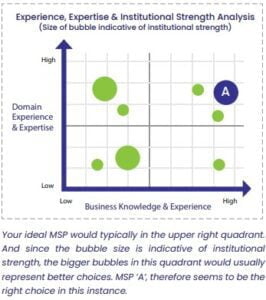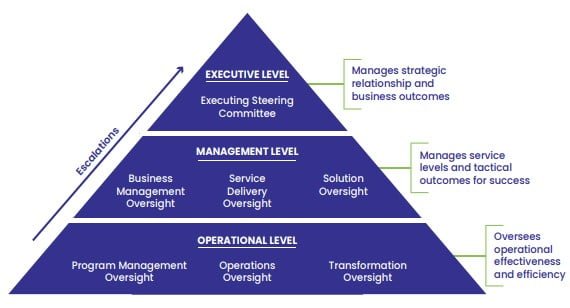
The Managed Services market is booming. And how!
As per an IDG report published in March 2022, the global Managed Services market stood at USD 239.71 billion in 2021 and is expected to clock a 13.4% growth rate (CAGR) from 2022 to 2030.
Other reports project different market sizes and growth rates. However, the base narrative remains the same: As companies realize that Managed Services are an essential tool required to navigate today’s unpredictable, complex markets, adoption is on the rise.
The expectation is that the Managed Services Provider (MSP) will provide you access to the right technology, talent, and processes proactively, quickly, and at cost-effective price points, enabling you to achieve the business outcomes you need.
However, choosing the right MSP for your organization can be tricky.
There is a plethora of MSPs out there, all of them offering what seem to be
copy-paste service propositions and benefits. And while the claims are bold, the fact is that many providers fall short on the delivery front. They assure you that they will work as true partners, but in reality, most of them stay stuck in the trusted supplier mode.
Also, even if an MSP is good, it might not necessarily be in sync with your organizational requirements.
Given this landscape, how do you identify the right MSP partner?
8 Key Pointers to Help You Select the Right MSP
Listed below are eight key pointers that characterize a good MSP. Evaluating potential providers against these eight pointers can help you select the MSP best suited to meet your organizational needs.
-
Strong Experience, Expertise & Institutional Strength
The MSP you select needs in-depth experience and expertise in the required domain area; that’s the basic 101.
Only if your provider is equipped with specialized functional/technical skills and industry exposure in the domain area, would it be able to leverage its experience to meet your requirements effectively.
Along with domain expertise, business know-how and strategic-thinking abilities too are crucial qualifying characteristics for a good MSP.
Unlike a traditional outsourcing agency that focuses on activity/task delivery, the MSP is expected to focus on the intended business outcome.
Therefore, it is essential that your provider has the requisite business knowledge to understand your priorities and can partner not just in task execution, but also in strategy formulation. You need a provider that has the business know-how to sit down with the senior management team, understand their vision and objectives, and develop a plan to translate them into outcomes.
To ensure that the MSP you select has a demonstrated history of experience and expertise, use the reputation and reference route.
Reputation & Reference Checklist:
- Strong client references
- Credibility with regulators, supervisors, and vendors
- Demonstration of thought leadership in the domain area
- Track record of successful adherence to industry and function-specific regulatory updates
- Track record of industry best practices driven level of effort
- Demonstrated history of strategic-thinking capabilities
- Demonstrated history of business know-how abilities
 Domain expertise and business experience established, you need to look for the third differentiator, institutional strength. This is the one that catapults the MSP into the ‘marry’ category.
Domain expertise and business experience established, you need to look for the third differentiator, institutional strength. This is the one that catapults the MSP into the ‘marry’ category.Evaluate the MSP on institutional strength areas such as;
- Longevity
- Global presence
- Financial soundness & size
- Ability to attract high-quality talent
A strong score in these areas reassures you that the MSP is there for the long haul and has the muscle to invest in the infrastructure, technology, talent, and processes you need.
-
Skilled, Specialized, Long-Tenure Employees; Adequate Staffing
The ideal MSP provides you access to the specialized skill sets you need, at the level you need, not just today but in the future too. So look out for a provider that continuously invests in training and updating its employees.
Another characteristic you need to assess is the MSP’s ability to attract and retain talent. Quality, long-term staff and low attrition rates translate into a strong talent pool and tenure efficiencies as knowledge is not lost in employee churn.
Indicators of an MSP’s ability to attract and retain talent:
- Well-defined, rigorous techniques used to identify, recruit, and maintain resources
- Disciplined approach to employee career development and growth
- Emphasis on skills development, coaching, and mentoring
- Good reputation and strong employer branding
- Best-in-class remuneration topped up with additional performance rewards
Along with skilling, specialization, and tenure, check the staffing levels that the provider is proposing to complete the job.
You don’t want an MSP that operates at bare minimum staffing levels. Sure, the job gets done, but the slim staffing levels don’t leave the MSP with any bandwidth to innovate.
If your MSP builds in a cushion on the staffing front, it gives itself room to ideate, innovate, and recognize improvement opportunities for its clients.
-
Proactive, Outcome-focused Support, and Forward Vision to Help You Future-Proof Your Business
Willingness to look beyond the ask; this is one of the most critical, defining qualities of the ideal MSP.
Willingness to look beyond the ask; this is one of the most critical, defining qualities of the ideal MSP.
Evaluate:
- Does the MSP have the expertise and inclination to constantly scout for vulnerabilities and value creation opportunities?
- Is the MSP willing to shift track to deliver optimum outcomes?
- Does the MSP have the expertise and experience required to get ahead of issues before they get out of hand?
- Does the MSP have the skills and experience to identify and actualize performance improvement opportunities that you may be unaware of?
If the MSP scores yes on all these counts, it is a keeper.
Strawberry Shortcake Vs Vanilla Cake
So, you are planning a party. You tell the catering team that you want to wow the guests with a special dessert. You decide that vanilla cake is a good option. The party happens. The caterers bake a brilliant vanilla cake. The guests quite like it.
Now a slightly different scenario: After meeting you, the catering team goes back and does some homework. It realizes that vanilla cake is very last season. Strawberry shortcakes are the new in thing. So, the caterers suggest a menu change. Their pastry chef bakes a wonderful strawberry shortcake for your party. The guests love it. Wow factor established!
The second scenario is an excellent example of proactive, outcome-focused support. Instead of fixating on the narrow deliverable of ‘Vanilla Cake’, the catering team focuses on the broader goal you want to achieve, “The Wow Factor”. It uses its expertise to identify a superior value option and leverages its in-house skills to deliver this option to you.
-
Collaborative, Flexible, Innovative Approach

Flexibility, agility, scalability and innovation – most MSPs tout these benefits as their value proposition. Confirm whether your potential provider can deliver on these promises.
-
Is the MSP offering you customized solutions?
Over time, an MSP develops comfort with certain products, processes, and technologies. It tends to leverage them when building solutions. And yes, the MSP’s experience and expertise in these areas yield you an advantage.
However, is your MSP willing to invest time and effort in assessing the suitability of the technologies and processes vis-à-vis your requirements? Is the MSP product/process agnostic? Will it provide you a solution customized to your needs?
If not, you should be looking elsewhere.
-
Is the MSP offering you a collaboratively developed, well-defined service catalog?
The service catalog is the heart of a strong, turnkey Managed Service. This service catalog is a discrete way of defining the results you want to achieve. It lists the desired deliverables the MSP provides, along with the key differentiators such as service levels, complexity levels or any other methods you would like to differentiate essential outcomes. The catalog also specifies the standard costs associated with the service offers.
A mature MSP would offer you a standard catalog of service that could be easily understood and consumed by your organization.
But the MSP you want is the one that goes a step further.
It would define the service catalog in collaboration with you. Customer preference, your preference, would be used to determine the offerings. The indicators used to qualify the service offerings would be developed collaboratively too.
-
Is the MSP offering you scalability?
On the scalability front, a good MSP allows you to select the type and level of service you want.If your requirements change, will your MSP be able to scale up or down, providing you with all the services and support you need when you need them?
-
Is the MSP willing to shift track to achieve the desired outcome?
The ideal MSP focuses on outcomes rather than narrow task/activity definitions. (Strawberry Shortcake vs Vanilla Cake)Do check if your MSP is committed to finding innovative, effective ways to improve performance. Ask the MSP if they are open to shifting track and redefining activities/ tasks to achieve the intended outcomes. Better still, see if they can provide you with client references for such instances.
-
Is the MSP offering you innovative pricing terms?
Mature MSPs, the world over, are embracing the consumption-based pricing trend that allows you to pay for the Managed Services on an as-per-usage basis.However, some are going a step ahead; they are committing to optimizing cost structures and transferring some of the gains back to their clients.
These providers are confident that they will be able to leverage multiple efficiencies – tenure efficiencies, capacity efficiencies, automation efficiencies, and functional efficiencies – to deliver great results at the best possible price.
Partnering with such a provider puts you in a win-win situation. If there are savings, you share in them. If there is a miscalculation, the risk is on the MSP.
-
-
Coopetition to facilitate multi-vendor involvement
Coopetition = Collaboration + Competition
The ideal MSP recognizes that it may need to work in coopetition with other vendors to achieve client objectives.
These other vendors may well be the MSP’s competitors. However, instead of undermining them, a good provider focuses on working in partnership with the competition so that it can deliver higher value to the client. It realizes that the best way to get ahead of the competition is not to undermine others but to work more innovatively and collaboratively.
Before signing on the dotted line, confirm if your MSP allows you the flexibility to bring in new vendors on an as-required basis without disrupting the existing service delivery relationship.
-
Mature Program Governance, extending from strategy to execution
Any managed service project entails a level of business transformation desired by the customer. Delivering this transformation, your intended business outcome, is not possible without a mature program governance structure.
Look for an MSP whose team structure and governance allow it to operate at all operational, tactical, and strategic levels.

This multi-level governance structure enables the provider to implement the managed service/task, continuously monitor it, and also make necessary course corrections as and when required.
You are assured of alignment of goals at strategic levels, alignment of VLAs at tactical levels, and alignment of operating procedures at operational levels. Only when all three levels are in tandem will the MSP be able to deliver your business objective optimally.
-
VLAs, not SLAs

As the maturity levels of outsourcing engagements advance, service level agreements too have started moving up the relevance path.
Traditional SLAs focused on task/activity achievement parameters such as response and resolution times. However, good MSPs recognize that the achievement of such SLAs does not necessarily translate into desired outcome achievement.
Therefore, they are moving towards the value level agreements (VLAs) model.
VLAs link service delivery to desired business outcomes, which means MSP measures its results in terms of the value they have been able to create for their partner, you.
YSince the desired outcomes would differ across engagements – enhanced customer experience, new functionality delivery, ability to adapt to change, increased process reliability – the VLAs would be defined as per your requirements.
Has your preferred MSP demonstrated the ability to talk and negotiate VLAs? If not VLAs, is it at least discussing Value Level Objectives (VLOs)?
The ability to set VLAs (or, failing that, VLOs) collaboratively with you signifies the expertise and maturity of the MSP. Also, when results are tracked in terms of value delivered, chances are that outcome achievement will improve.
-
Transparency & Good-Fit Assessment
Openness, accountability, and transparency are essential differentiators that set apart a good MSP.
Not only does a mature, strong MSP have the experience and expertise to define fixed, clear cost structures and deliverables, it can also clearly outline its culture, processes, approaches, technology, and tools.
This transparency enables you to make an upfront assessment of the fit between the MSP and your organization, an essential selection criterion given the partnership nature of Managed Services engagements.
The ideal MSP is also transparent about its performance. Its offering would come complete with dashboards that allow you to track the service provider’s activities across the strategic, tactical and operational levels, ensuring you have visibility right from vision setting to actual delivery.
Summary
To identify the MSP best suited to meet your organizational needs and deliver required outcomes, you must keep eight key pointers in mind. You have to consider if the MSP offers you:
- Strong experience, expertise & institutional strength
- Skilled, specialized, long-tenured employees and adequate staffing levels
- Proactive, outcome-focused support, and forward vision to help you future-proof your business
- Coopetition to facilitate multi-vendor involvement
- Mature program governance structure, extending from strategy to execution
- Collaborative, flexible, innovative approach
- VLAs, not SLAs
- Transparency & good-fit assessment
Discover Managed Services from Artech
From vision to delivery excellence, Artech’s Managed Services are enabling clients across the globe to achieve the business outcomes they need, intelligently.
To know more about how our solutions can add value to your organization, write to us at bruce.gerken@artech.com
This content is crafted with care by Artech Staff Authors. While it reflects our commitment to quality and accuracy, please note that it is not authored by industry experts. We aim to offer valuable and engaging information, and for more specialized or technical advice, we recommend consulting with professionals in the relevant field. If you have any concerns or require further assistance, please contact us at support@artech.com. Thank you for trusting Artech as your source of informative content.








